On a seasonally adjusted basis, the NAB Online Retail Sales Index recorded a drop in growth in July


Insight
A shopfront to the world: how Amazon’s arrival could spell opportunity for Australian retailers.

Commentators have coined a name for what happens when the American online behemoth comes to town, with its keen pricing and lightning fast dispatch – the Amazon Effect.
For small and medium-sized enterprises, however, the presence of Amazon, the world’s largest retailer, could provide an opportunity to expand, both locally and internationally. Business View reports.
Amazon moving into Australia and opening its doors for business Down Under has proved one of the country’s most highly anticipated business debuts.
Amazon has leased warehouse space in outer Melbourne to establish what’s expected to be the first of many ‘fulfilment centres’ in Australia.
In addition to its own retail offering, Amazon has also launched Australian Marketplace – a third-party selling platform that charges retailers a monthly fee of $49.95 to list their products. Sales incur a commission of between six and 15 per cent. The platform is responsible for more than 50 per cent of Amazon’s revenue worldwide.
Amazon Australia Country Manager Rocco Braeuniger says customers around the globe enjoy the almost boundless selection on offer via the Amazon Marketplace. For local suppliers, the platform can represent a golden opportunity to amplify their reach.
“With more than half of units sold globally coming from Marketplace sellers, we know that customers love the unique selection that they bring,” Braeuniger says.
“We are excited to work with many thousands of Australian businesses to help them reach more than 300 million customers around the world and to grow their business.”
Australians have long embraced internet shopping with gusto. According to the latest NAB Online Retail Sales Index, the country’s online retail market was worth $22.74 billion in the 12 months to June 2017, with customers buying up big on everything from homewares and appliances to fashion, groceries, liquor and games.
The internet has opened new sales channels for thousands of local merchants and ‘online business only’ enterprises are commonplace, particularly among the millennial cohort of ‘digital natives’.
Ipsos research commissioned by NAB in 2017 showed local businesses derived 22 per cent of their revenue from online sales. Almost half of those surveyed used social media to market themselves.
‘Digital disruption’ – the term used to describe the technology-driven upheaval of traditional business models – had affected the businesses of 54 per cent of those surveyed.
Business owners reported digital disruption had significantly increased customer expectations, ramped up competition, changed the way new customers were won, and forced them to innovate constantly.
Amazon’s launch in Australia may provide a spur for small and medium enterprises that have been slow to the online party, according to NAB’s Executive General Manager of Digital & Innovation, Jonathan Davey.
“If you’re a traditional retailer without an ecommerce presence, it’s time to start thinking about how to develop that capability and what you need to do that,” Davey says.
Amazon’s physical presence in other jurisdictions has been linked with a surge in online activity; a development that can present an opportunity for local retailers that position themselves to appeal to online shoppers, as well as in-the-flesh customers.
“Consumer behaviour is evolving and small businesses need to get in front of that,” Davey says.
“Based on the experience in other countries, Amazon will change the shape of the retail industry in Australia and we want to encourage our customers to take advantage of this and leverage the opportunity.
“We’re focused on helping them to prepare and build the ecommerce capabilities they’re going to need to maintain and expand their operations in the digital sphere.”
For some businesses, that may mean undertaking branding and marketing activities or creating a catalogue to showcase their wares online. Small businesses looking for expert help to do so can connect with local professionals via proquo, a digital marketplace established jointly by NAB and Telstra in 2016.
“These are things that require focus and need to be prioritised but they’re relatively easy to do and if you get them right, you may be able to reach a larger audience,” Davey says.
“It’s an attractive proposition for small businesses.”
MyDeal founder and CEO Sean Senvirtne says Davey is on the money.
Senvirtne has turned his retail start-up into a $35 million online marketplace showcasing more than 5,000 brands, on the back of slick marketing, speedy service and a relentless focus on customer experience.
He believes small businesses need to be attuned to the dynamics of the digital era if they’re to flourish and expand.
“We need to understand what’s coming up – what’s happened and what’s happening in the digital space,” he says.
“Amazon is highly consumer-centric and they’re going to raise the bar – everyone else will have to keep up. I believe their presence in Australia will increase the number of people buying online and increase their trust and confidence in doing so. That may present a really good opportunity for small businesses.”
© National Australia Bank Limited. ABN 12 004 044 937 AFSL and Australian Credit Licence 230686.